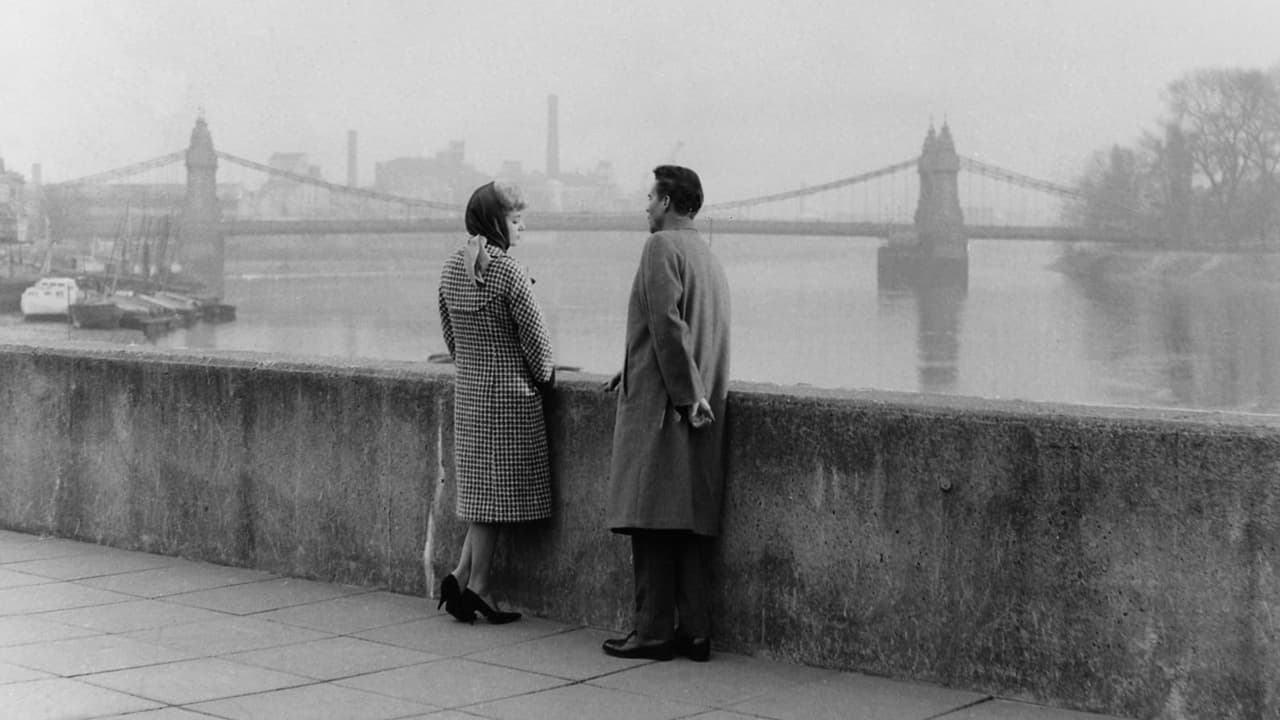GamerTab
That was an excellent one.
Inclubabu
Plot so thin, it passes unnoticed.
Tetrady
not as good as all the hype
Glucedee
It's hard to see any effort in the film. There's no comedy to speak of, no real drama and, worst of all.
clanciai
Highly sensitive and important thriller charting the dilemma of homosexuals being extorted for what they are and bringing the necessary attention to inhuman legislation in the field to have it reformed and changed. This was the first film of its kind in England and was soon to be followed by others. Dirk Bogarde makes a very truthful characterization of the lawyer who risks his career, well aware that he can't avoid public unpleasantness or even ruin, by taking up the fight with the blackmailers. The tension of the thriller is that you can never guess who the real blackmailer is until the motives behind it surfaces toward the end. Sylvia Syms makes an equally convincing performance in playing the honest wife who realizes the importance of uncompromisingly facing the truth. The insight into the matter goes deep and is very revealing in its thoroughness and more or less exposes the whole width of the terrible dilemma, which should have been settled with already by the experience of Oscar Wilde. Here it takes two suicides for the matter to be brought to final trial, and it was definitely about time. Dennis Price is also in it, and Peter McEnery opens the drama by staging a mystery - its revelation brings on Dirk Bogarde to action. Philip Green's music adds to the drama, and Basil Dearden's direction is uncompromisingly relentless.
audiemurph
This is a great British drama. Most of the other reviews focus on the homosexual context of the film, which is certainly important from a social standpoint; however I would like to focus on how great this movie is, aside from the gay angle.What impresses me most about this film is how tight and taut it is. Not a word is wasted. Every actor moves with incredible precision; not a pinky wiggles unnecessarily at any moment. The effect is mesmerizing. The script is fast-paced and constantly moves the plot forward. The camera-work is sublime, masterfully and carefully zooming in here, gracefully panning there; a true masterpiece of art from the director.Dirk Bogarde plays the upper class barrister with the true stiff-upper lip that we associate with the Britain's best class. His wife, played by Sylvia Sims, does not overdo her part as the humiliated wife; this is a role that could easily have slid into over-ripe dramatics, but she is as equally reserved and in control as her husband.All of the supporting cast are top tier as well. The blackmailer, who we meet not too far into the movie, is particularly sleazy and slimy, in a manner reminiscent of some of Dirty Harry's lead criminals. And don't assume you know everything that is going on either; the script has a number of twists and surprises at the end that will leave you very satisfied and entertained - you will be pleasantly surprised at how easily you have been misdirected! There are a couple of delicious ironies in the film. First, look for, in the apartment of the man who is blackmailing homosexuals, a sketch of Michelangelo's (nude) David. Very cute and clever. And second: hey, who is that actor in the tiny role of George, the assistant to the hairdresser? Its Frank Thornton, better known as "Captain Peacock" of the great British comedy, "Are You Being Served"; you will remember that the funniest cast member of that series was John Inman, playing the hilariously flamboyant and openly gay Mr. Humphries! A highly recommended drama.
Arcadio Bolanos
Dirk Bogarde (famous for his main role in "Death in Venice") is Melville Farr, a most successful lawyer that has gained acceptance in the Chamber of Lords and is about to become a judge. He's wealthy and famous, he lives more than comfortably and he is married to a beautiful woman. Is he the perfect man? Well, he would be for any open-minded individual, but not for those of more traditional upbringing.Melville Farr defies law, his acts mock morality, and his thoughts are not of a decent nature. He is, after all, a man doomed to survive in a time in which homosexuality was a crime, a time in which exposing his true nature would have meant being imprisoned.At the beginning of the movie, a young man nicknamed 'Boy' is searching for him. He calls him constantly but the more desperate he gets in trying to reach him, the more Melville Farr eludes him. Farr has spent time with Boy, perhaps too much, and because of this intimacy he fears that he may be heinously extorted. The truth is, however, that Boy is the one being blackmailed by someone who has discovered his homosexual tendencies and has a compromising photography of the young man and the prestigious and well-respected barrister. Set in the early 60s, this film courageously denounces what could be, perhaps, one of the most unfair rules in Britain: the criminalization of homosexuality.Judith Butler studied postmodernist and poststructuralist theories to define the "subject" relying in linguistic terminology, not unlike what Jacques Lacan attempted while coming up with terms like the symbolic order (the system of signs and conventions that form our perception, our very reality). Compelled "by social sanction and taboo", society learns to discriminate those who oppose the heterosexual norms. As a result, our belief in "natural" behavior is really the result of a mixture of indirect and flagrant coercions. Repudiation towards gays, lesbians or bisexuals becomes necessary for the standard subject to establish "an identification with the normative phantasm of sex".For Butler gender is a construction that regularly conceals its genesis. And that genesis is not physical but performative; the body becomes its gender only "through a series of acts which are renewed, revised, and consolidated through time" (through a certain performativity that varies in each culture, one might add). Should we critique the assumptions of normative heterosexuality? Certainly those punitive rules (social, familial, and legal) have forced us to conform to hegemonic, heterosexual standards for identity.It's only fitting then, that the protagonist of "Victim" is a man of law, and through sheer performativity, in this case the kind of performativity that also sustains and nurtures the law, he will face a most difficult dilemma. After Boy's capture, police officers start investigating the origin of the extortion. As a consequence, Melville will no longer be able to ignore this situation, as he would have preferred to do. Why is this a dilemma? He can't confess to the police the fact that he had a relationship with another man, as that is forbidden. But, at the same time, he cannot let the blackmailers get away unpunished.As he starts investigating who could be responsible of blackmailing Boy, he digs deeper and deeper into London's gay scene. He meets men that sleep with men, people that forever hide in the shadows, and soon he learns that there are many homosexuals paying money to avoid being exposed.At the end, he must make a final stand. If his decision is to stop the criminals that threaten to destroy so many lives, he must first collaborate with the police and come forward embracing his true sexuality. That, of course, guarantees the end of his brilliant career, all of his professional ambitions will come to a halt should he decide to tell the truth. But at the same time, and this is most notorious, by playing by the rules, he also has the opportunity to perform in front of a jury, and as the nature of law is similar to the conformation of human habits, id est, it's prone to change and alteration, here performativity can also turn into the necessary coup de etat to vanquish a most ruthless law."Victim" was a brave production and a most controversial film in a difficult time, tackling an aspect of British law that would compare the simple fact of being gay to an arm robbery, thus condemning homosexuals to be locked behind bars, no matter how peaceful or harmless they could be. Butler's project has been so far to quote the law in order to reiterate and coopt its power, to expose the heterosexual matrix and to displace the effect of its necessity. If Farr decides to confess he's gay to his wife and to the world, he will have one chance, one shot at exposing the heterosexual normativity and undermine it long enough for people to accept that, perhaps, against everything they have been taught, an option different from heterosexuality might not mean the end of the world.
ianlouisiana
It is 1961 but the so - called "Swinging Sixties" are still in the unimaginable future.Homosexual acts between males are against the law.A married barrister is so deep in the closet he's in Narnia.A young male friend "Boy" Barrett is desperate for help as he is on the run after embezzling money to pay off a blackmailer.His calls to the barrister go unanswered and he hangs himself in a police cell,in his possession a scrapbook with press cuttings referring to the barrister's career. Melville Farr (Mr Dirk Bogarde) is about to take silk,the first step to a possible judgeship down the line,but his guilt over his feelings towards Barrett and his deception of his wife finally leads him to try and track down the blackmailer whatever the cost to himself. "Victim" cleverly weaves a straightforward detective story with a plea for tolerance towards homosexuals in an age when it was in rather short supply. Mr Bogarde gives a very moving performance as Melville Farr,a man who has for many years subjugated his natural instincts to conform with the perceived "normality" of his class and profession.After a disastrous gay affair he married the very young and naive daughter of a judge and clearly loves her but is still tortured by his feelings towards his own sex. The wife is played by the very beautiful Miss Sylvia Sims,hot on the heels of playing Mr Laurence Harvey's showgirl lover in "Expresso Bongo". This stunning,versatile actress is as sensitive and vulnerable as Bogarde's wife as she was brash and hard - boiled as Harvey's girlfriend. Mr Derren Nesbett is brilliantly slimy as the repressed gay blackmailer's bagman.Looking for all the world like a malevolent Zoot Sims,he plays his part with lip - smacking relish. But much of the joy in "Victim" is in the careful casting of the smaller roles,none of whom falls into the easy trap of stereotyping gay men. Having been brought up in gay - friendly Brighton I was familiar with the demi- monde homosexuals felt they were forced to inhabit and it is well - realised in this picture.I am a little surprised that the pub featured in "Victim" wasn't one of the several London venues which gays had made their own,even in the 1950s.Still,perhaps the producers were using the "pub as a microcosm of society" argument. Despite perhaps a slight over - egging of the "gays are just folks" pudding,this is a fine picture,one which signalled a change of direction for Mr Bogarde's career,gave notice to the public that there were severe inequities in the way the law regarded sexuality,and demonstrated that British Cinema was still a force to be reckoned with. If you wish to learn for yourself the injustices visited on homosexual men prior to the Wolfenden report,read "Against The Law",a 1954 memoir by Peter Wildeblood who - along with Lord Montagu and Michael Pitt - Rivers - was imprisoned for having sexual relations with servicemen. his account of hypocrisy in high places details the price paid by gay men 50 years ago that helped achieve the freedom they enjoy now.

